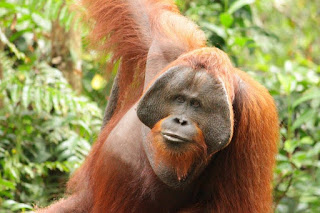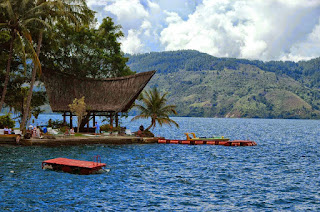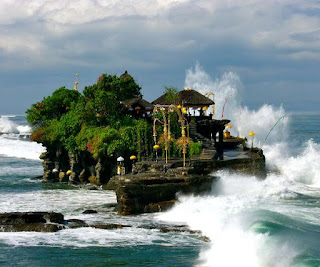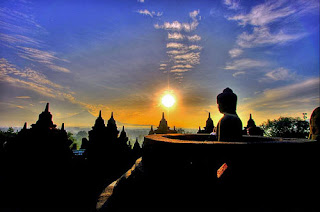 |
| Papua Tourism |
Papua is one of Indonesia area including a greater part of the western portion of New Guinea Island and close-by. The area initially secured the whole western portion of New Guinea, yet in 2003, the western part of the territory, on the Bird's Head Peninsula, was proclaimed in Jakarta as discrete region named West Irian Jaya. The lawfulness of this division has been debated, as it seems to strife with the states of the Special Autonomy status granted to Papua in the year 2000. The status of West Irian Jaya territory is not yet determined starting mid 2006.
Papua is the official Indonesian and globally perceived name for the region. Amid the pioneer time the area was known as Dutch New Guinea. The territory was known as West Irian or Irian Barat from 1969 to 1973, and after that renamed Irian Jaya ("Victorious Irian") by Soeharto. This was the official name until Papua was embraced in 2002. Today, locals of this area like to call themselves Papuans as opposed to Irianese. This might be because of historical background (differently distinguished as a genuine derivation or a society historical background) the name of Irian, which comes from the acronym Ikut Republik Indonesia, Anti Nederland (join/take after with the Republic of Indonesia, dismissing The Netherlands). The name West Papua is utilized among Papuan separatists and more often than not alludes to the entire of the Indonesian segment of New Guinea.
The capital of Papua area is Jayapura. The greater part of the populace relies on upon subsistence cultivating, particularly the development of rice and maize. The principle businesses incorporate copper (with the biggest grouping of copper on the planet at Tembagapura), palm oil, copra, maize, groundnuts, pepper, fish, gold, oil, coal, and phosphates. It is for the most part a rocky and forested district, with the Maoke Mountain range ascending to 5,029-m/16,499 ft at Jaya Peak. The populace involves Melanesians (unique pioneers of Western New Guinea), Papuans, Negritos, and Europeans. Indigenous animism wins. The territory pronounced freedom from Indonesia, as West Papua, in June 2000. Notwithstanding, the president of Indonesia expressed that the statement was unrepresentative of genuine feeling in the area.
Topographically
A focal East-West mountain range rules the geology of New Guinea, more than 1600 km in all out length. The western segment is around 600 km long and 100 km over. Steep mountains 3000 to 4000 m and up to 5000 m high along the extent guarantee an unfaltering supply of downpour from the tropical air. The tree line is around 4000 m height and the tallest tops are snowbound year round.
Both North and West of the focal extents the area stays rocky for the most part 1000 to 2000 m high secured by thick rain woodland and a warm moist year round atmosphere. The third significant living space highlight is the southeast swamps with broad wetlands extending for several kilometers.
Mamberamo River once in a while alluded to the "Amazon of Papua" is the area's biggest waterway, which winds through the northern part of the territory. The outcome is an expansive zone of lakes and streams known as the Lakes Plains district. The celebrated Baliem Valley, home of the Dani individuals is a tableland 1600 m above ocean level amidst the focal mountain range; Jaya Peak, once in a while known by its previous Dutch name Carstensz Pyramid, is a fog secured limestone mountain crest 5030 m above ocean level.
Wide Area
The wide region of Papua is 420,000 sq km/162,000 sq mi.
Population
Papua populace in light of 2000 est. is 2,220,900. It has somewhere in the range of 240 distinctive tribal people groups, each with its own dialect and society. Indigenous Papuans in West Papua and Papua New Guinea talk exactly 15% of the world's known dialects. West Papua together with whatever remains of the island of New Guinea, are the lungs of the Asia-Pacific, containing the last extraordinary surviving virgin rainforest after the Amazon.
Demographics
The number of inhabitants in Papua territory and the neighboring West Irian Jaya, both of which are still under a unified organization, totaled 2,646,489 in 2005. Since the mid 1990s, Papua has had the most elevated populace development rate of every Indonesian area at more than 3% yearly. This is somewhat a consequence of high birth rates, additionally from migration from different locales in Indonesia.
As per the 2000 statistics, 78% of the Papuan populace recognized themselves as Christian with 54% being Protestant and 24% being Catholic. 21% of the populace was Muslim and under 1% were Buddhist or Hindu. There is additionally generous routine of animism by Papuans, which is not recorded by the Indonesian government in accordance with the approach of Pancasila.
Environment
An imperative tropical rainforest with the tallest tropical trees and boundless biodiversity, Papua's known backwoods fauna incorporates marsupials (counting possums, wallabies, tree-kangaroos, cuscuses), different well evolved creatures (counting the imperiled Long-angled Echidna), numerous fledgling species (counting flying creatures of heaven, cassowaries, parrots, cockatoos), the world's longest reptiles (Papua screen) and the world's biggest butterflies. The island has an expected 16,000 types of plant, 124 genera of which are endemic.
The broad conduits and wetlands of Papua are likewise home to salt and freshwater crocodile, tree screen, flying foxes, osprey, bats and different creatures; while the tropical icy mass fields remain to a great extent unexplored.
In February 2006, a group of researchers investigating the Foja Mountains, Sarmi, found various new types of flying creatures, butterflies, creatures of land and water, and plants, including a types of rhododendron, which may have the biggest blossom of the class. Natural dangers incorporate logging-affected deforestation, woodland transformation for manor horticulture (particularly oil palm), little holder farming change, the presentation and potential spread of non-local outsider species, for example, the Crab-eating Macaque, which preys on and contends with indigenous species, the unlawful species exchange, and water contamination from oil and mining operations.
Districts
Indonesia structures areas contains of regimes and sub regions inside those. In spite of the fact that names and zones of control of these provincial structures can differ after some time as per changing political and different prerequisites, in 2005 Papua area comprised of 19 rules. The regimes are: Timika, Yapen - Waropen, Biak - Numfor, Nabire, Puncak Jaya, Paniai, Jayawijaya, Merauke, Sarmi, Keerom, Waropen, Tolikara, Yahukimo, Bintang Mountain, Boven Digoel, Mappi, Asmat, Supiori, and Jayapura. Notwithstanding these, Jayapura city additionally has the status of rule.
Government
Papua territory has administered by a specifically chose senator (as of now Barnabas Suebu) and a provincial lawmaking body, DPRP (Dewan Perwakilan Rakyat Papua). A novel government association that just exists in Papua is the MRP (Majelis Rakyat Papua/Papuan People's Council) that was shaped by the Indonesian Government in 2005 as a coalition of Papuan tribal boss, tasked with assertion and talking for Papuan tribal traditions.
Source / More : Papua Tours
Tags : #papuatourism #papuatour #indonesiatourism #papua irian
Papua is the official Indonesian and globally perceived name for the region. Amid the pioneer time the area was known as Dutch New Guinea. The territory was known as West Irian or Irian Barat from 1969 to 1973, and after that renamed Irian Jaya ("Victorious Irian") by Soeharto. This was the official name until Papua was embraced in 2002. Today, locals of this area like to call themselves Papuans as opposed to Irianese. This might be because of historical background (differently distinguished as a genuine derivation or a society historical background) the name of Irian, which comes from the acronym Ikut Republik Indonesia, Anti Nederland (join/take after with the Republic of Indonesia, dismissing The Netherlands). The name West Papua is utilized among Papuan separatists and more often than not alludes to the entire of the Indonesian segment of New Guinea.
The capital of Papua area is Jayapura. The greater part of the populace relies on upon subsistence cultivating, particularly the development of rice and maize. The principle businesses incorporate copper (with the biggest grouping of copper on the planet at Tembagapura), palm oil, copra, maize, groundnuts, pepper, fish, gold, oil, coal, and phosphates. It is for the most part a rocky and forested district, with the Maoke Mountain range ascending to 5,029-m/16,499 ft at Jaya Peak. The populace involves Melanesians (unique pioneers of Western New Guinea), Papuans, Negritos, and Europeans. Indigenous animism wins. The territory pronounced freedom from Indonesia, as West Papua, in June 2000. Notwithstanding, the president of Indonesia expressed that the statement was unrepresentative of genuine feeling in the area.
Topographically
A focal East-West mountain range rules the geology of New Guinea, more than 1600 km in all out length. The western segment is around 600 km long and 100 km over. Steep mountains 3000 to 4000 m and up to 5000 m high along the extent guarantee an unfaltering supply of downpour from the tropical air. The tree line is around 4000 m height and the tallest tops are snowbound year round.
Both North and West of the focal extents the area stays rocky for the most part 1000 to 2000 m high secured by thick rain woodland and a warm moist year round atmosphere. The third significant living space highlight is the southeast swamps with broad wetlands extending for several kilometers.
Mamberamo River once in a while alluded to the "Amazon of Papua" is the area's biggest waterway, which winds through the northern part of the territory. The outcome is an expansive zone of lakes and streams known as the Lakes Plains district. The celebrated Baliem Valley, home of the Dani individuals is a tableland 1600 m above ocean level amidst the focal mountain range; Jaya Peak, once in a while known by its previous Dutch name Carstensz Pyramid, is a fog secured limestone mountain crest 5030 m above ocean level.
Wide Area
The wide region of Papua is 420,000 sq km/162,000 sq mi.
Population
Papua populace in light of 2000 est. is 2,220,900. It has somewhere in the range of 240 distinctive tribal people groups, each with its own dialect and society. Indigenous Papuans in West Papua and Papua New Guinea talk exactly 15% of the world's known dialects. West Papua together with whatever remains of the island of New Guinea, are the lungs of the Asia-Pacific, containing the last extraordinary surviving virgin rainforest after the Amazon.
Demographics
The number of inhabitants in Papua territory and the neighboring West Irian Jaya, both of which are still under a unified organization, totaled 2,646,489 in 2005. Since the mid 1990s, Papua has had the most elevated populace development rate of every Indonesian area at more than 3% yearly. This is somewhat a consequence of high birth rates, additionally from migration from different locales in Indonesia.
As per the 2000 statistics, 78% of the Papuan populace recognized themselves as Christian with 54% being Protestant and 24% being Catholic. 21% of the populace was Muslim and under 1% were Buddhist or Hindu. There is additionally generous routine of animism by Papuans, which is not recorded by the Indonesian government in accordance with the approach of Pancasila.
Environment
An imperative tropical rainforest with the tallest tropical trees and boundless biodiversity, Papua's known backwoods fauna incorporates marsupials (counting possums, wallabies, tree-kangaroos, cuscuses), different well evolved creatures (counting the imperiled Long-angled Echidna), numerous fledgling species (counting flying creatures of heaven, cassowaries, parrots, cockatoos), the world's longest reptiles (Papua screen) and the world's biggest butterflies. The island has an expected 16,000 types of plant, 124 genera of which are endemic.
The broad conduits and wetlands of Papua are likewise home to salt and freshwater crocodile, tree screen, flying foxes, osprey, bats and different creatures; while the tropical icy mass fields remain to a great extent unexplored.
In February 2006, a group of researchers investigating the Foja Mountains, Sarmi, found various new types of flying creatures, butterflies, creatures of land and water, and plants, including a types of rhododendron, which may have the biggest blossom of the class. Natural dangers incorporate logging-affected deforestation, woodland transformation for manor horticulture (particularly oil palm), little holder farming change, the presentation and potential spread of non-local outsider species, for example, the Crab-eating Macaque, which preys on and contends with indigenous species, the unlawful species exchange, and water contamination from oil and mining operations.
Districts
Indonesia structures areas contains of regimes and sub regions inside those. In spite of the fact that names and zones of control of these provincial structures can differ after some time as per changing political and different prerequisites, in 2005 Papua area comprised of 19 rules. The regimes are: Timika, Yapen - Waropen, Biak - Numfor, Nabire, Puncak Jaya, Paniai, Jayawijaya, Merauke, Sarmi, Keerom, Waropen, Tolikara, Yahukimo, Bintang Mountain, Boven Digoel, Mappi, Asmat, Supiori, and Jayapura. Notwithstanding these, Jayapura city additionally has the status of rule.
Government
Papua territory has administered by a specifically chose senator (as of now Barnabas Suebu) and a provincial lawmaking body, DPRP (Dewan Perwakilan Rakyat Papua). A novel government association that just exists in Papua is the MRP (Majelis Rakyat Papua/Papuan People's Council) that was shaped by the Indonesian Government in 2005 as a coalition of Papuan tribal boss, tasked with assertion and talking for Papuan tribal traditions.
Source / More : Papua Tours
Tags : #papuatourism #papuatour #indonesiatourism #papua irian







